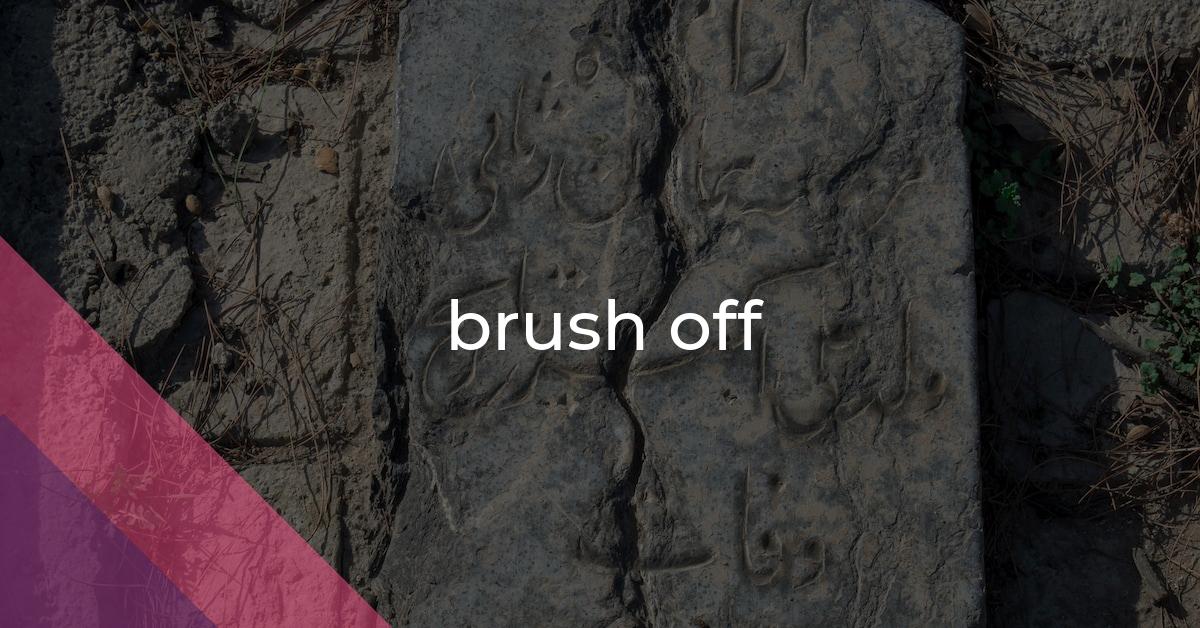brush off: Idiom Meaning and Origin
What does ‘brush off’ mean?
The idiom brush off means to dismiss, ignore or reject something or someone casually or nonchalantly.

Idiom Explorer
The idiom "sweep aside" means to dismiss or ignore something or someone as unimportant or insignificant, usually due to a lack of interest or consideration.
The idiom "dust off a batter" means to defeat someone easily, especially in a sports or competitive context.
The idiom "drop off the radar" means to disappear or to no longer be noticed or observed, often referring to a person or a thing that was previously in the public eye or under close scrutiny but is now completely forgotten or ignored.
When used as an idiom, "drive off" means to leave quickly or abruptly in a vehicle. It is often used to describe someone leaving a place in a hurry.
The idiom "do away with" means to eliminate or get rid of something completely. It is often used to talk about getting rid of something that is considered unnecessary or undesirable.
The idiom "dash off" means to quickly write or complete something, usually in a careless or hurried manner.
The idiom *cross off* means to remove or mark something as completed or finished.
The idiom "chase off" means to forcefully make someone or something leave or go away, usually by pursuing or driving them away.
The idiom "chalk off" means to remove or erase something, typically a task or item from a list, by marking it with chalk. It is often used to indicate the completion or cancellation of a task or the removal of a name from a list.
The idiom "catch dust" means to become unused or obsolete over time, often due to lack of interest or demand. It implies that something is being ignored or forgotten, gathering dust like an unused object.
Unveiling Rejection
The idiom "brush off" is commonly used in American English to describe the act of dismissing or ignoring someone or something. It can also refer to the act of removing dirt or dust from a surface by brushing it away. The origins of this idiom can be traced back to the early 20th century.
The term "brush off" is derived from the verb "brush." When used metaphorically, the idiom conveys the idea of figuratively brushing away someone or something in a dismissive manner.
One possible explanation for the origin of this idiom is that it was inspired by the physical act of brushing away dust or dirt from clothing. In a similar manner, people may use the phrase "brush off" to metaphorically remove someone or something from their attention or concern, as if they were removing an unwanted speck of dust.
Another possible origin could be the brushing-off motion used to shoo away insects or pests. The act of flicking away bothersome insects could have been metaphorically extended to signify dismissing unwanted individuals or ideas. This could be seen as a way of erasing their presence or influence.
The idiom "brush off" is often used in informal conversations and can be seen in various contexts. It can be used in response to unwanted advances or invitations, indicating a lack of interest or willingness to engage further. It can also be used to describe a disregard for criticism or negative comments, suggesting a nonchalant attitude towards such feedback.
While "brush off" primarily conveys a sense of dismissal or indifference, it can also carry undertones of rudeness or disrespect, depending on the context and tone of the conversation. The idiom is commonly used in both spoken and written language and is easily understood by native English speakers.
The related idiom "brush aside" has a similar meaning to "brush off." It also means to dismiss or ignore someone or something, but with a slightly stronger implication of disregarding their importance or relevance. It conveys a more forceful act of dismissing, as if actively pushing someone or something out of the way.
Similarly, the idiom "sweep aside" has a similar meaning to "brush off" but with an added sense of power or authority. It suggests that the act of dismissing someone or something is done decisively and with confidence, as if effortlessly sweeping them aside, removing them from consideration.
The idioms "blow off" and "cast aside" are also related to "brush off." They both convey the act of dismissing or ignoring someone or something. "Blow off" suggests a more casual or nonchalant dismissal, as if the person or thing being dismissed is easily blown away by a gust of wind. "Cast aside" implies a deliberate act of discarding or abandoning, as if physically casting someone or something away.
Overall, understanding the meaning and usage of "brush off" and its related idioms can help individuals navigate informal conversations and comprehend the intentions of others. These idioms provide a way to convey dismissal or indifference in a concise and relatable manner.
Example usage
Examples of how the idiom *brush off* can be used in a sentence:
- When I tried to talk to him about my problems, he just brushed me off and walked away.
- She decided to brush off the negative comments and focus on her work.
- The CEO brushed off the concerns raised by the employees, leading to discontent in the company.
More "Dismissal" idioms



